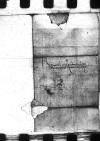List #5706
Sigismund I Jagiellon do Ioannes DANTISCUSVilnius, 1541-11-01
| odebrano Heilsberg (Lidzbark Warmiński), 1541-11-16 Rękopiśmienne podstawy źródłowe:
Pomocnicze podstawy źródłowe:
Publikacje:
| ||||||||||||||
Tekst + aparat krytyczny + komentarzZwykły tekstTekst + komentarzTekst + aparat krytyczny
Reveren(d)o in Christo Patri, domino
Reveren(d)o in Christo Patri, domino Ioanni episcopo Varmiensi sincere nobis dilecto
Reveren(d)e in Christo Pater, sincere nobis dilecte.
Quod fuerit studium paper damaged⌈[ium]ium paper damaged⌉ Paternitatis Vestrae, ut difficillimis his et periculosis temporibus aliqua fieret paper damaged⌈[t]t paper damaged⌉ [...] paper damaged⌈[...][...] paper damaged⌉ n paper damaged⌈[n]n paper damaged⌉ecessitate
Quae vero scribunt ad nos consiliarii de appellatio paper damaged⌈[latio]latio paper damaged⌉nibus, quibus causis adducti eorum precibus locum non dederimus, ex nostris ad illos litteris Paternitas Vestra cognoscet.
Quae bene valeat.
Ex mandato regiae maiestatis proprio


 BNW, BOZ, 953, f. 204v
BNW, BOZ, 953, f. 204v